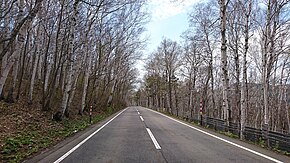Japan National Route 281
| National Route 281 | ||||
|---|---|---|---|---|
| 国道281号 | ||||
Japan National Route 281 highlighted in red | ||||
 | ||||
| Route information | ||||
| Length | 111 km[1] (69 mi) | |||
| Major junctions | ||||
| West end | ||||
| East end | ||||
| Location | ||||
| Country | Japan | |||
| Highway system | ||||
| ||||
National Route 281 (国道281号, Kokudō Nihyaku hachi-juichigō) is a national highway of Japan that traverses the prefecture of Iwate in a southwest–northeast routing. It connects the prefecture's capital city, Morioka to the coastal city of Kuji. It has a total length of 111 kilometers (69 mi).
Route description
[edit]
National Route 281 crosses Iwate Prefecture in a southwest–northeast routing. Beginning at a junction with national routes 4 and 282 in the prefecture's capital city, Morioka, it travels north alongside the two routes out of Morioka. In the city of Takizawa, National Route 282 leaves the concurrency near Takizawa Interchange on the Tōhoku Expressway. The concurrency of national routes 4 and 281 continues northeast, briefly crossing back in to Morioka, before entering the town of Iwate. In Iwate, National Route 281 leaves National Route 4, traveling east across the Kitakami Mountains towards the coastal city of Kuji. In the mountains, it passes through the town of Kuzumaki where it briefly has a concurrency with National Route 340. Upon crossing over the crest of the mountains, the highway enters Kuji. From there, it follows the Kuji River down to the central district of the city. After passing through the central part of Kuji, the highway terminates at a junction with National Route 45. It has a total length of 111 kilometers (69 mi),[1] though only 76.4 kilometers (47.5 mi) of that total distance is routed independently from National Route 4.[2]
History
[edit]On 20 January 1954, a section of the Katsumaki–Numakunai route from the then-town of Kuji to the town of Numakunai was designated as a major local road that would later be included into National Route 281. On 16 August of the same year, the Iwate Prefectural Government certified the Kuji–Numakunai Route as a prefectural route.[3] On 1 April 1970, National Route 281 was created when it was designated as General National Route 281 between the cities of Morioka and Kuji.[4]
The highway served as an evacuation route for the city of Kuji following the 2011 Tōhoku earthquake and subsequent tsunami.[5] Following the disaster, a mountainous section of the highway was rebuilt as a part of the region-wide recovery effort to improve the effectiveness of the highway during future evacuations. The straightening project is set to be completed in 2020.[6]
Major intersections
[edit]The route lies entirely within Iwate Prefecture.
| Location | km[2] | mi | Destinations | Notes | |||
|---|---|---|---|---|---|---|---|
| Morioka | 0.0 | 0.0 | Western terminus; highway continues south as National Route 4 | ||||
| 1.7 | 1.1 | ||||||
| Takizawa | 9.1 | 5.7 | Iwate Prefecture Route 16 (Morioka Belt Highway) – Koiwai | Eastern end of National Route 282 concurrency | |||
| 9.8 | 6.1 | E4 exit 43 (Takizawa Interchange) | |||||
| Morioka | 15.8 | 9.8 | Iwate Prefecture Route 169 south – Iwaizumi Iwate Prefecture Route 301 north – Tamayama Branch Office | ||||
| 21.0 | 13.0 | Iwate Prefecture Route 129 west – Hachimantai | |||||
| Iwate | 25.2 | 15.7 | Iwate Prefecture Route 157 north – Iwate-Kawaguchi Station | ||||
| 31.8 | 19.8 | Iwate Prefecture Route 17 – Hachimantai, Numakunai | |||||
| 35.1 | 21.8 | Eastern end of National Route 4 concurrency | |||||
| 36.8 | 22.9 | ||||||
| Kuzumaki | 49.7 | 30.9 | Iwate Prefecture Route 253 west – Kitayamagata | ||||
| 62.1 | 38.6 | Iwate Prefecture Route 30 west | Iwate Prefecture Route 30 is closed to through traffic | ||||
| 64.1 | 39.8 | Iwate Prefecture Route 15 north – Ichinohe | |||||
| 68.0 | 42.3 | Western end of National Route 340 concurrency | |||||
| 69.0 | 42.9 | Eastern end of National Route 340 concurrency | |||||
| Kuji | 76.1 | 47.3 | Iwate Prefecture Route 29 east – Noda | ||||
| 82.9 | 51.5 | Iwate Prefecture Route 272 west – Nikarube | |||||
| 89.3 | 55.5 | Iwate Prefecture Route 5 west – Kunohe | |||||
| 97.0 | 60.3 | ||||||
| 108.9 | 67.7 | Iwate Prefecture Route 124 east – Kuji Station | |||||
| 109.0 | 67.7 | Iwate Prefecture Route 7 south | |||||
| 111.0 | 69.0 | Iwate Prefecture Route 268 east – Kosode | Eastern terminus; roadway continues as Iwate Prefecture Route 268 | ||||
1.000 mi = 1.609 km; 1.000 km = 0.621 mi
| |||||||
See also
[edit]References
[edit]- ^ a b "一般国道の路線別、都道府県別道路現況" [Road statistics by General National Highway route and prefecture] (PDF) (in Japanese). Ministry of Land, Infrastructure, Transport and Tourism. Retrieved 18 February 2020.
- ^ a b "Route 281" (Map). Google Maps. Retrieved 21 November 2020.
- ^ 県道路線の認定(昭和29年岩手県告示第649号) [Prefectural road route certification (1954 Iwate Prefecture Notification No. 649] (in Japanese). Iwate Prefecture. 1954.
- ^ 一般国道の路線を指定する政令 [Cabinet Order Designating General National Routes] (in Japanese). Cabinet of Japan. 1965. Retrieved 19 November 2020 – via Wikisource.
- ^ "東日本大震災における道路の役割" [The role of roads in the Great East Japan Earthquake] (PDF) (in Japanese). Ministry of Land, Infrastructure, Transport and Tourism. 13 March 2011. Retrieved 19 November 2020.
- ^ "一般国道281号下川井工区についてご紹介いたします" [Introducing the Shimokawai construction zone on National Route 281] (PDF) (in Japanese). Iwate Prefectural Government. 20 February 2019. Retrieved 19 November 2020.
External links
[edit] Media related to Category:Route 281 (Japan) at Wikimedia Commons
Media related to Category:Route 281 (Japan) at Wikimedia Commons


